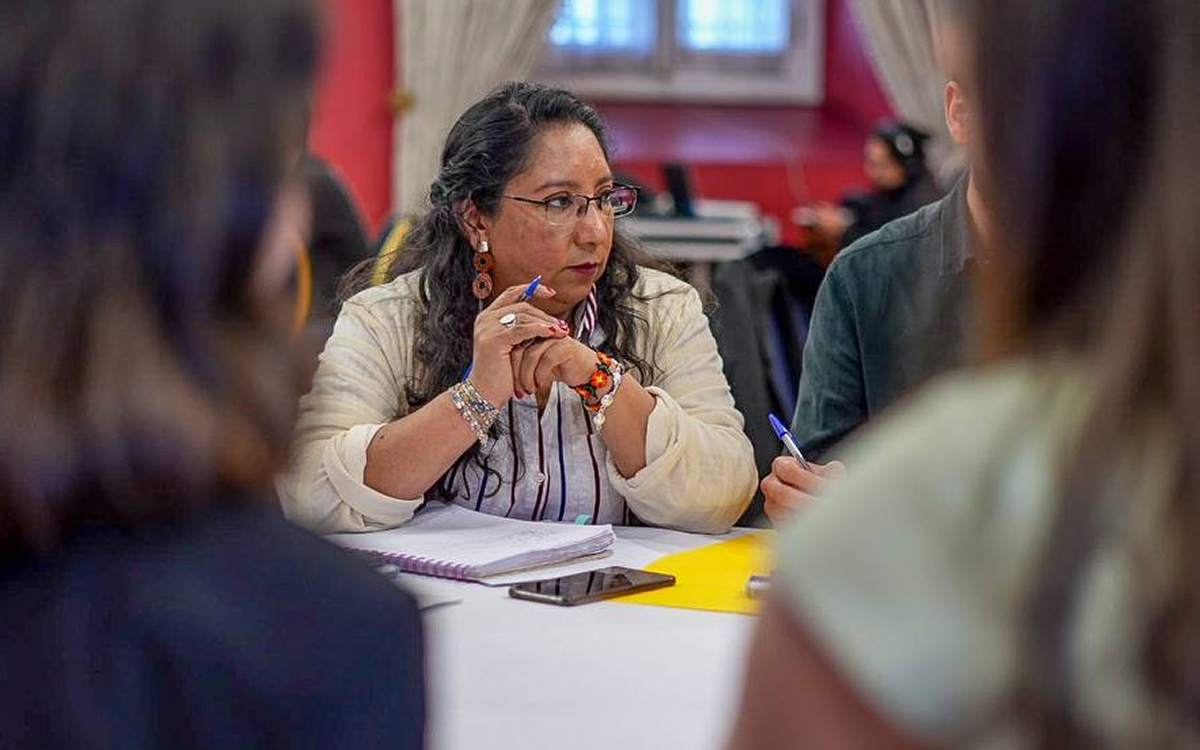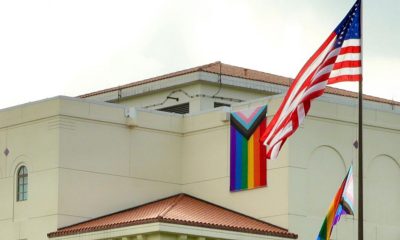South America
Chilean government launches LGBTQ, intersex rights campaign
Women and Gender Equity Undersecretary Luz Vidal Huiriqueo spoke exclusively with the Blade

SANTIAGO, Chile — Chilean President Gabriel Boric on Wednesday launched his government’s first LGBTQ and intersex rights campaign that seeks to reduce discrimination against the country’s queer community.
According to the Movement for Homosexual Integration and Liberation (Movilh), a Chilean LGBTQ and intersex rights organization, hate crimes against the community have increased this year by 66 percent. Five people have also been murdered because of their sexual orientation, gender identity and/or expression.
Boric during his campaign against José Antonio Kast, a far-right former congressman, pledged to promote LGBTQ and intersex rights and policies during his administration. The #LivingWithPride campaign is part of these efforts.
Boric’s first gesture towards the queer community was to appoint Marco Antonio Avila, a gay man, as his government’s education minister and Alexandra Benado Vergara, a lesbian woman, as Chile’s next sports minister. Ávila and Benado arrived at La Moneda, the Chilean presidential palace, with Boric on March 11 when he took office.
“President Gabriel Boric Font’s government has implemented a series of measures that seek to advance in safeguarding the rights of LGBTQ+ people,” Women and Gender Equity Undersecretary Luz Vidal Huiriqueo told the Washington Blade in an exclusive interview after the government launched the #LivingWithPride (#VivirConOrgullo in Spanish) campaign.
Vidal said “one of the relevant lines of work that the Ministry of Women and Gender Equity has developed since we took office … seeks to highlight the structural difficulties experienced by people of the LGBTIQA+ community, move towards state representation, since there is currently no institutionality that welcomes this community.”
“This is why we have taken the mandate to welcome this population, within the legal possibilities that govern the ministry,” Vidal emphasized to the Blade.
Vidal said “the gender mainstreaming network that has been reactivated with our government has opened a door to the organizations of the LGBTIQA+ community in all portfolios.”
“The advisors in charge of gender mainstreaming do not understand gender in a binary way, they have the conviction that we must also develop public policies for the LGBTIQA+ community.” she told the Blade.
Boric directed the Women and Gender Equity Ministry and his administration’s sociocultural coordinator to create and lead an “LGBTIQA+ Roundtable,” which includes organizations, activists and members of the LGBTQ Congressional Caucus to work to implement their demands because Chile thus far does not have a government institution that specifically addresses queer rights.
“The roundtable’s objective is to generate and prioritize, together with the LGBTIQA+ community, guidelines for the development of public policies on the matter, from an intersectoral perspective,” said Vidal. “More than 35 civil society organizations from all over the country, representatives of the Legislative Branch and different (Executive Branch) portfolios have participated.”
Vidal stressed “this space of constant linkage with social organizations has allowed us to know the reality that social organizations of the LGBTIQA+ community live when linking with State agencies.” She also noted “the experience has been successful, being a valuable space that will allow us to build a work path for the design of gender equality public policies relevant to the LGBTIQA+ community, to improve their lives and eradicate gender-based violence and hate crimes against the community.”
The roundtable has been meeting once a month since May. It’s last 2022 meeting will take place this month, and it will resume its work next year.
Vidal told the Blade that transgender women can now use her ministry’s public policies.
“We consider trans women as part of the diversity of women, which implies that they can access the different benefits of the National Service for Women and Gender Equity (SernamEG), which is the executing body of the ministry’s programs,” she said.
Another initiative Vidal highlighted is the incorporation of a “social name” section in the public employment pages for those who have not yet legally changed their name. This option allows people to identify themselves as trans or nonbinary.
The Education Ministry “has developed a participatory process for the design of the Bill on National Policy on Education on Affectivity and Comprehensive Sexuality. It has also made it possible for students, mothers, fathers, parents, guardians and education workers to participate in what Vidal described as “non-sexist” education workshops.
Chile
Transgender woman sues Chilean national police
Isabella Panes alleges she suffered harassment, exclusion after becoming ‘carabinera’

Isabella Panes in 2022 was celebrated as a symbol of inclusion.
Wearing an olive green uniform and a shy smile, she appeared in the media and on social media as Chile’s first trans female “carabinera” or national police officer. The Carabineros promoted Panes as a sign of openness, but that story has become a dramatic case of institutional discrimination.
Panes today faces the Carabineros in court.
She has denounced a series of systematic acts of exclusion, harassment at work, and violation of fundamental rights that she and her defense team maintains pushed her into a mental health crisis that almost cost her her life.
“My hope is that tomorrow we will be able to live in a world of equality for all. Just that we understand that we are human beings and we have to make life a lot easier for each other,” Panes told the Washington Blade during an exclusive interview.
Panes, 29, grew up in Laja in the Biobío region.
She dreamed of becoming a “carabinera” since she was a child, despite the fact that she faced discrimination because of her gender identity. After years of effort, surgeries and a difficult transition, Panes enrolled in the Carabineros Academy in 2021.
Panes faced the challenge of making her medical processes compatible with the physical demands of training. Even so, she graduated with good marks, and was recognized as part of the new institutional image the Carabineros wanted to project after the 2021 social unrest tarnished their image.
This institutional support disappeared after the media campaign.
Panes alleges she was marginalized from operational duties and relegated to administrative tasks, despite her interest in and training to patrol the streets like any other officers.
“I joined the Carabineros to serve, not to be a marketing decoration,” she said. “I was offered to be part of the change, but only if I kept quiet and accepted the mistreatment.”
The accusations against the Carabineros are serious: Constant mockery by colleagues, dissemination of private information about her personal life, invasive questions about her body and sexual orientation. Panes’s legal representatives said this abuse took place within a context where the institution did not take effective measures to protect their client.
The Carabineros Social Security Administration, known by the Spanish acronym Dipreca, also refused to cover her transition-related medical procedures, arguing they were “aesthetic,” despite medical reports that indicated their importance for Panes’s mental health and well-being.
Panes in January attempted to kill herself by suicide. She managed to survive after calling Chile’s 4141 mental health care number for help.
“They were killing me slowly, from the inside,” said Panes.
Panes has brought her case to the Supreme Court after a lower court ruled in favor of Dipreca’s decision to not cover her medical treatments.
Her legal team in a lawsuit has also accused the Carabineros of employment and systematic discrimination. Panes is seeking damages and institutional reforms.
“The Carabineros used Isabella to clean up its public image, but when it came to guaranteeing real rights, they abandoned her,” said Javiera Zúñiga, spokesperson for the Movement for Homosexual Integration and Liberation, a Chilean advocacy group.
“It is not enough to show up at the Pride march,” she added. “True inclusion is demonstrated in deeds, in daily dealings, in respect for the dignity of all people.”
Panes’s case starkly exposes the limits of diversity policies when there is no deep institutional commitment to implement them.
“I am no longer afraid,” said Panes, ”What happened to me cannot happen again. Not for me, but for all those who come after me.”
Brazil
US lists transgender Brazilian congresswoman’s gender as ‘male’ on visa
Erika Hilton has represented São Paulo since 2022

A transgender Brazilian congresswoman says the U.S. issued her a visa that listed her gender as “male.”
Erika Hilton on Wednesday wrote on her Instagram page that she requested a visa that would have allowed her to travel to the U.S. in order to participate in the Brazil Conference at Harvard University and the Massachusetts Institute of Technology.
The conference took place earlier this month.
“I was classified as ‘male’ by the U.S. government when I went to get my visa,” wrote Hilton, who added a visa she received from the U.S. in 2023 listed her gender as “female.”
Hilton is a Black travesti and former sex worker from São Paulo who won a seat in the Brazilian Congress in 2022. The Washington Blade spoke with Hilton shortly after her election.
“It is a big responsibility … but I feel very honored,” said Hilton. “I very much like to be able to be a representative for my people, and the more than 250,000 people who voted for me have confidence in me,” she said after she spoke at a rally in support of now Brazilian President Luiz Inácio Lula da Silva in a São Paulo square. “This demonstrates that our work has the potential to have a gigantic reach; where we can advance efforts to end death, poverty, misery, genocide that we have.”
President Donald Trump in his inaugural speech announced the federal government’s “official policy” is “there are only two genders, male and female.” The Trump-Vance administration has also banned the State Department from issuing passports with “X” gender markers.
Germany and Denmark are among the countries that have issued travel advisories for trans and nonbinary people who plan to visit the U.S. These warnings come ahead of WorldPride, which is scheduled to take place in D.C. from May 17-June 8.
Hilton said she is “not surprised” the U.S. issued her a visa with a male gender marker.
“I’m also not surprised by the level of hatred and fixation these people have with trans people,” she said. “After all, the documents I presented are rectified, and I’m registered as a woman, even on my birth certificate.”
Hilton further accused the U.S. of “ignoring official documents from other sovereign nations, even from a diplomatic representative.”
“At the end of the day, I’m a Brazilian citizen, and my rights are guaranteed and my existence is respected by our own constitution, legislation, and jurisprudence,” she said.
Editor’s note: Duda Salabert, another transgender Brazilian congresswoman, also said the U.S. listed her gender as “male” on her American visa.
Argentina
Gay, nonbinary parent fights for family in Argentina’s courts
Leonardo Hatanaka alleges they were fired after requesting paternity leave

An unprecedented case could set an important legal precedent for the rights of labor rights for LGBTQ families in Latin America.
Leonardo Hatanaka, a Brazilian pharmaceutical professional, expects an imminent ruling from the Superior Court of Justice in the Autonomous City of Buenos Aires in a case that alleges discriminatory dismissal based on sexual orientation, gender identity, and xenophobia after their son Matteo’s birth in Argentina via “solidarity gestation.” Human rights organizations and international agencies have followed the case closely.
Genzyme de Argentina S.A. and Sanofi in 2023 fired Hatanaka weeks after they notified them of their son’s paternity and requested 180-day parental leave.
“Matteo’s birth was the realization of a dream and the right to form a family with love, dignity and equality, even if that means having to fight every day for our family to be recognized as such,” Hatanaka told the Washington Blade in an exclusive interview.
The National Institute Against Discrimination, Xenophobia and Racism, a government agency known by the acronym INADI that President Javier Milei’s administration has shut down, in November 2023 said Hatanka’s termination was motivated by discrimination based on sexual orientation and gender identity.
(Milei took office in December 2023.)
The General Directorate of Coexistence in Diversity in Buenos Aires’s government in 2024 said institutional xenophobia motivated the firing.
“I am a gay man, foreign, nonbinary, and I had requested to exercise my right to parental leave,” Hatanaka explained. “The company denied access to a basic right to care, which it does provide in other countries, and did not provide any medical coverage for our son, despite his legal registration with both parents’ names.”
Sanofi did not acknowledge responsibility, offer apologies or any kind of reparations, despite the two rulings.
“It was devastating. I was caring for a newborn, at a moment of enormous vulnerability, and the company chose just that moment to abandon us,” said Hatanaka.
The National Labor Court overturned an initial injunction that ordered Hatanaka’s reinstatement. Hatanaka appealed the decision to the Superior Court of Justice in the Autonomous City of Buenos Aires.
“I hope for justice; that the discrimination suffered is recognized, and that this ruling serves as a precedent for all diverse families and LGBTQ+ people who are seeing their rights violated,” said Hatanaka.
The Argentine LGBT Federation, SOS Homophobie in France, and Mothers of Resistance in Brazil are among the organizations that have expressed their support. The latest U.N. report on anti-LGBTQ discrimination also notes the case.
“Companies must go beyond marketing,” Hatanaka emphasized. “Real inclusion requires concrete actions, consistency, and respect for their own policies.”
Hatanaka stressed that “there are instruments such as the UN Guiding Principles on Business and Human Rights. It is time for them to comply with them.” The lawsuit has also become a symbol of the struggle for equality and protection of families with parents who are the same sex.
“I feel I represent many LGBTQ+ families who live in fear of losing everything by exercising their rights,” said Hatanaka. “LGBTQ+ parenting is legitimate, real and deserves protection. No family should be punished for existing.”
-

 Obituary4 days ago
Obituary4 days agoLocal attorney, LGBTQ rights advocate Dale Sanders dies at 75
-

 U.S. Federal Courts3 days ago
U.S. Federal Courts3 days agoFederal judge blocks Trump passport executive order
-

 Mexico4 days ago
Mexico4 days agoGay couple claims Puerto Vallarta wedding venue discriminated against them
-

 Books3 days ago
Books3 days ago‘Pronoun Trouble’ reminds us that punctuation matters











